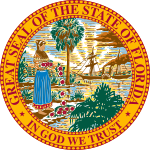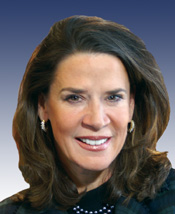Disfranchisement, also called disenfranchisement, or voter disqualification is the restriction of suffrage of a person or group of people, or a practice that has the effect of preventing a person exercising the right to vote. Disfranchisement can also refer to the revocation of power or control of a particular individual, community or being to the natural amenity they have; that is to deprive of a franchise, of a legal right, of some privilege or inherent immunity. Disfranchisement may be accomplished explicitly by law or implicitly through requirements applied in a discriminatory fashion, through intimidation, or by placing unreasonable requirements on voters for registration or voting.

Gregory Allyn Palast is an author and a freelance journalist who often worked for the BBC and The Guardian. His work frequently focuses on corporate malfeasance but he has also worked with labour unions and consumer advocacy groups.
The 2000 United States presidential election recount in Florida was a period of vote recounting in Florida that occurred during the weeks after Election Day in the 2000 United States presidential election between George W. Bush and Al Gore. The Florida vote was ultimately settled in Bush's favor by a margin of 537 votes when the U.S. Supreme Court, in Bush v. Gore, stopped a recount that had been initiated upon a ruling by the Florida Supreme Court. Bush's win in Florida gave him a majority of votes in the Electoral College and victory in the presidential election.
Voter caging involves challenging the registration status of voters and calling into question the legality of allowing them to vote. Usually it involves sending mail directly to registered voters and compiling a list from mail returned undelivered. Undeliverable mail is seen as proof that the person no longer resides at the address on their voter registration. The resultant list is then used by election officials to purge names from the voter registration rolls or to challenge voters' eligibility to vote on the grounds that the voters no longer reside at their registered addresses.
During the 2004 United States elections, concerns were raised about various aspects of the voting process, including whether voting had been made accessible to all those entitled to vote, whether ineligible voters were registered, whether voters were registered multiple times, and whether the votes cast had been correctly counted. More controversial was the charge that these issues might have affected the reported outcome of the presidential election, in which the incumbent, Republican President George W. Bush, defeated the Democratic challenger, Senator John Kerry. Despite the existing controversies, Kerry conceded the election the following day on November 3.
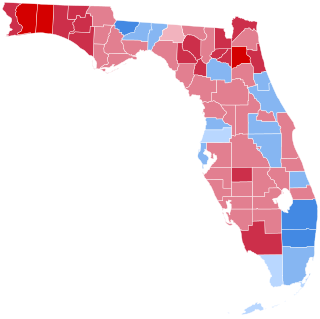
The 2000 United States presidential election in Florida took place on November 7, 2000, as part of the nationwide presidential election. Florida, a swing state, had a major recount dispute that took center stage in the election. The outcome of the 2000 United States presidential election was not known for more than a month after balloting because of the extended process of counting and recounting Florida's presidential ballots. State results tallied on election night gave 246 electoral votes to Republican nominee Texas Governor George W. Bush and 255 to Democratic nominee Vice President Al Gore, with New Mexico (5), Oregon (7), and Florida (25) too close to call that evening. Gore won New Mexico and Oregon over the following few days; but the result in Florida was to be decisive, regardless of how those two states had voted.

Susan Marie Bucher served as the Supervisor of Elections in Palm Beach County, Florida. Prior to her election as the Supervisor, she served as a member of the Florida House of Representatives, representing the 86th District from 2000 to 2002, and the 88th District from 2002 to 2008. She is a Democrat.
Loss of rights due to criminal conviction refers to the practice in some countries of reducing the rights of individuals who have been convicted of a criminal offence. The restrictions are in addition to other penalties such as incarceration or fines. In addition to restrictions imposed directly upon conviction, there can also be collateral civil consequences resulting from a criminal conviction, but which are not imposed directly by the courts as a result of the conviction.
John Christian Adams is an American attorney and conservative activist formerly employed by the United States Department of Justice under the George W. Bush administration. Since leaving the DOJ, Adams has become notable for making alarmist and false claims about the extent of voter fraud in the United States. He has falsely accused a number of legitimate voters of being fraudulent, and has published information about them online, including Social Security numbers.
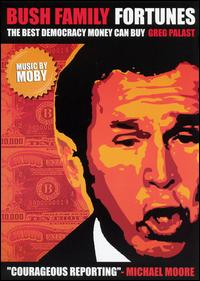
Bush Family Fortunes: The Best Democracy Money Can Buy is a 2004 documentary film directed by Steven Grandison and Greg Palast. The film, which examines various aspects of the Presidency of George W. Bush, including the 2000 US Presidential election and the Iraq War, is adapted from the 2003 BBC production Bush Family Fortunes and based on the 2002 book The Best Democracy Money Can Buy by investigative journalist Palast, who had spent years tracking the Bush family for the BBC and The Guardian newspaper. The research for the original BBC film, which claims to have exposed the George W. Bush military service controversy, was also drawn upon by Michael Moore for Fahrenheit 9/11 (2004) and footage was used by Robert Greenwald in Unprecedented: The 2000 Presidential Election (2002).
Shelby County v. Holder, 570 U.S. 529 (2013), was a landmark decision of the Supreme Court of the United States regarding the constitutionality of two provisions of the Voting Rights Act of 1965: Section 5, which requires certain states and local governments to obtain federal preclearance before implementing any changes to their voting laws or practices; and Section 4(b), which contains the coverage formula that determines which jurisdictions are subject to preclearance based on their histories of discrimination in voting.

Voter suppression in the United States is various legal and illegal efforts to prevent eligible voters from exercising their right to vote. Where found, such voter suppression efforts vary by state, local government, precinct, and election. Voter suppression has historically been used for racial, economic, gender, age and disability discrimination. Before and during the American Civil War, most African-Americans had not been able to vote. After the Civil War, all African-Americans were granted voting rights, causing some Southern Democrats and former Confederate states to institute actions such as poll taxes or language tests that were ostensibly not in contradiction to the U.S. Constitution at the time, but were used to limit and suppress voting access, most notably African American communities that made up large proportions of the population in those areas, but in many regions the majority of the electorate as a whole was functionally or officially unable to register to vote or unable to cast a ballot. African Americans' access to registration and voting in the South was often difficult until the Civil Rights Act of 1964, and continues to be a subject of debate.
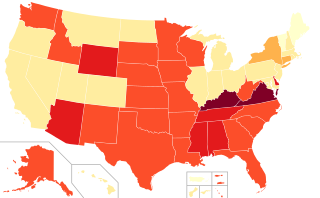
Felony disenfranchisement in the United States is the suspension or withdrawal of voting rights due to the conviction of a criminal offense. The actual class of crimes that results in disenfranchisement vary between jurisdictions, but most commonly classed as felonies, or may be based on a certain period of incarceration or other penalty. In some jurisdictions disfranchisement is permanent, while in others suffrage is restored after a person has served a sentence, or completed parole or probation. Felony disenfranchisement is one among the collateral consequences of criminal conviction and the loss of rights due to conviction for criminal offense. In 2016, 6.1 million individuals were disenfranchised on account of a conviction, 2.47% of voting-age citizens. As of October 2020, it was estimated that 5.1 million voting-age US citizens were disenfranchised for the 2020 presidential election on account of a felony conviction, 1 in 44 citizens. As suffrage rights are generally bestowed by state law, state felony disenfranchisement laws also apply to elections to federal offices.
Rights restoration is the process of restoring voting rights to people with prior felony convictions who lost their voting rights under felony disenfranchisement. It may also refer to additional civil rights that are taken away upon conviction, such as holding public office and serving on a jury.

Interstate Voter Registration Crosscheck was a database in the United States which aggregated voter registration records from multiple states to identify voters who may have registered or voted in two or more states. Crosscheck was developed in 2005 by Kansas Secretary of State Ron Thornburgh in conjunction with Iowa, Missouri, and Nebraska. In December 2019, the program was suspended indefinitely as part of a settlement of a lawsuit filed by the American Civil Liberties Union of Kansas challenging Kansas' management of the program. Prior to Crosscheck's legally mandated suspension, a dozen states had withdrawn from the program citing the inaccurate data and risk of violating voters' privacy rights. Crosscheck was also accused of facilitating unlawful purges of voters in a racially discriminatory manner.
Felony disenfranchisement in Florida is currently a contentious political issue in Florida. Though the general principle of felony disenfranchisement is not in dispute, the disenfranchisement of people who had been convicted of a felony and have served their sentence — that includes prison, bail and parole — but continue being barred from voting if they have outstanding fines, fees or restitution obligations is in contention. Prior to January 8, 2019, when Amendment 4 came into effect, people convicted of a felony effectively lost their right to vote for life, as it could only be restored by the governor as an act of clemency, which rarely occurred. Florida was one of four states with a lifetime ban, the others being Iowa, Kentucky and Virginia.

Florida Amendment 4, also the Voting Rights Restoration for Felons Initiative, is an amendment to the Constitution of Florida passed by ballot initiative on November 6, 2018, as part of the 2018 Florida elections. The proposition restored the voting rights of Floridians with felony convictions after they complete all terms of their sentence including parole or probation. The amendment does not apply to Floridians convicted of murder or sexual offenses.
The Public Interest Legal Foundation (PILF) is an American conservative legal group based in Indianapolis, Indiana, which is known for suing states and local governments to purge voters from election rolls. The nonprofit was constituted in 2012.
Desmond Meade is a voting rights activist and Executive Director of the Florida Rights Restoration Coalition. As chair of Floridians for a Fair Democracy, Meade led the successful effort to pass Florida Amendment 4, a 2018 state initiative that restored voting rights to over 1.4 million Floridians with previous felony convictions. In April 2019, Time magazine named Meade as one of the 100 most influential people in the world. Meade's autobiography Let My People Vote: My Battle to Restore the Civil Rights of Returning Citizens was published in 2020; in 2021 he was awarded a MacArthur "Genius Grant."
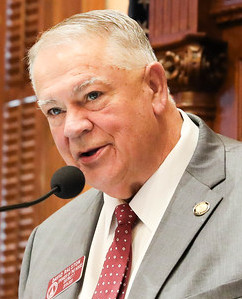
The 2020 Georgia House of Representatives elections took place on November 3, 2020 as part of the biennial United States elections. Georgia voters elected state representatives in all 180 of the state house's districts to the 156th Georgia General Assembly. State representatives serve two-year terms in the Georgia House of Representatives.
